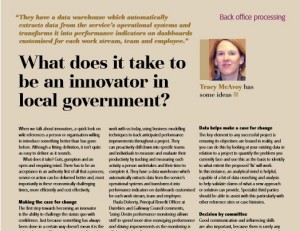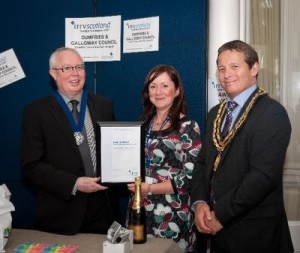 First published as “What does it take to be an innovator in local government?” in IRRV Insight Magazine’s April 2016 edition.
First published as “What does it take to be an innovator in local government?” in IRRV Insight Magazine’s April 2016 edition.
When we talk about innovators, a quick look on wiki references a person or organisation willing to introduce something better than has gone before. Although a fitting definition it isn’t quite as easy to deliver as it sounds.
What does it take? Guts, gumption and an open and enquiring mind. There has to be an acceptance in an Authority first of all that a process, service or action can be delivered better and most importantly in these economically challenging times, more efficiently and cost effectively.
Making the case for change
The first step towards becoming an innovator is the ability to challenge the status quo with confidence. Just because something has always been done in a certain way doesn’t mean it is the right or best way. The people we typically work with in Councils want to know everything there is to know about the data they hold. They want to be able to drill down into the detail to identify what their debt position is, which is their most successful recovery strategy or who proactively clears caseloads. Knowledge after all is power and to be able to move forward and bring positive change the first step is to audit your existing set up, infrastructure and processes to identify where you feel improvements can be made.
If you don’t measure it how do you know you need to change it
If you aren’t already measuring the area you wish to change for the better, then how do you know it needs change, how can you set realistic and achievable goals and how can you measure success once change has been implemented?
 Pioneers of change
Pioneers of change
Take Dumfries and Galloway Council for instance, one of our very first customers, they opted to undertake a whole business process re-engineering exercise. This included introducing a range of new technologies including workflow systems and OLAP reporting technology so that they could provide a step-change in performance.
An award winning authority, they continue to work with us today using business modelling techniques to track anticipated performance improvements throughout a project. They can proactively drill down into specific teams and individuals to measure and evaluate their productivity by tracking and measuring each activity a person undertakes and their time to complete it. They have a data warehouse which automatically extracts data from the Service’s operational systems and transforms it into performance indicators on dashboards customised for each work stream, team and employee.
Paula Doherty, Principal Benefit Officer at Dumfries and Galloway Council comments “using Destin performance monitoring allows staff to spend more time managing performance and driving improvements as the monitoring is all done for them.”
Change isn’t all about the big projects
It’s not all about the big projects though, sometimes it can be as simple as evaluating the performance of two teams to identify why one is outperforming the other and it’s not always related to the obvious. Do they have an easier case load? Is it down to the personnel in the team? Yes the data can provide the initial evidence that one team is indeed better but it can still require the skill of the manager to drill down into the detail to try and identify why and this requires tenacity, intelligence and curiosity in equal measure.
Why projects fail
One of the biggest reasons we see projects fail to get off the ground time and again is because Councils have no valid way of evaluating to what extent the project will work and what benefit it will bring without the project actually being implemented. It is in these instances that innovation can require a leap of faith or taking a calculated risk but if you are clear from the outset on how you will evaluate and prioritise things you can ultimately work out how successful the project will be in the end.
Data helps make a case for change
The key element to any successful project is ensuring its objectives are bound in reality, and you can do this by looking at your existing data in relation to a project to quantify the problem you currently face and use this as the basis to identify to what extent the proposed ‘fix’ will work. In this instance an analytical mind is helpful, capable of a bit of data crunching and analysis to help validate claims of what a new approach or solution can provide. Specialist third parties should be able to assist with this particularly with other reference sites or case histories.
Decision by committee
Good communication and influencing skills are also important because there is rarely any one person who makes a decision to proceed within an Authority. To push through change and get sign off on new projects you will most likely be lobbying different departments including finance and procurement to get budget for and fund the project as well as IT who may need to support new technologies and help install or implement them.
Get staff buy-in
If you are investing in new technology or processes your staff will be expected to adopt, it can make all the difference getting their buy-in early on by ensuring that they feel involved in the process from the start. By clearly explaining why you feel change is necessary and taking their views into account you are more likely to have people embrace the change.
Just to recap, it takes a lot to push through change in any organisation. As an innovator you typically will demonstrate confidence, curiosity, and an unwillingness to accept things as they are. Analysis and evaluation of where you are versus where you need to be is also a must and you then need solid people skills to see it through.
If you would like more information on how we can help you drive change and innovation in your Authority contact info@destin.co.uk or call 01772 842092.
